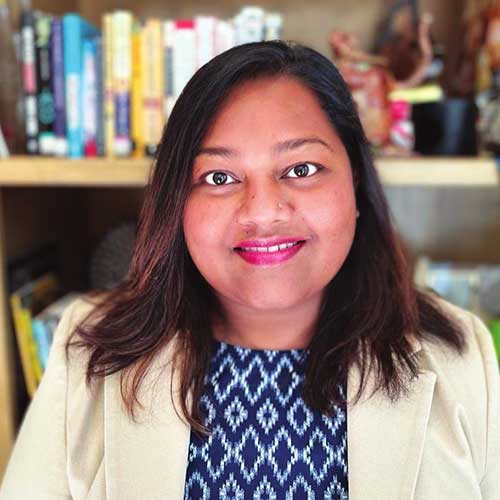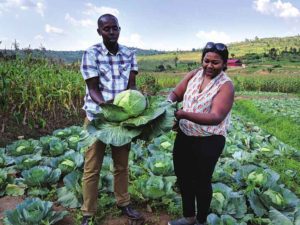
Fighting poverty through economics: Rashmi Ekka ’08 uses microfinance and agricultural development to tackle big-world food problems

Rashmi Ekka ’08 grew up as part of the Oraon tribe in Jharkhand, India, and has seen first-hand the impact of poverty. Over one-third of the population in her home state lives below the poverty line. A large fraction of the poor are farmers and yet they don’t have enough to eat themselves.
The College of Wooster economics graduate believes in the power of international development to reduce poverty. For almost 15 years, she has worked with farmers and entrepreneurs in places such as Afghanistan, Burkina Faso, Ethiopia, and Rwanda, using her expertise in microfinance and agricultural development to boost food and financial resources.
Ekka helped reduce the loss and waste of tomatoes harvested for markets in East Africa and encouraged a young woman with a food science background to apply for a development grant to start a tomato paste factory through a project improving postharvest practices. After receiving the grant, she used it to professionalize the tomato paste operation, boost marketing, and empower her role as an entrepreneur.
She started the factory to counter China’s dominance in Rwanda’s tomato paste market. It generated
employment for many people and provided more access to a nutritious, locally produced food product.
In developing countries, 30-50% of fresh fruits and vegetables can go to waste because of heat, poor harvesting practices, lack of proper packaging, and an inefficient supply chain, among a host of other reasons. Through research and training, Ekka’s project demonstrated to farmers how packing tomatoes in 20-pound crates rather than 100-pound woven jute bags could improve the quantity and quality of their products and increase profits. This led to many farmers adopting crates for their harvest.
“Once you introduce these changes, the whole agricultural system in a country changes. There is a big impact on income as well as nutrition,” said Ekka, a political science and religious studies minor at Wooster.
When she was deciding on a college, Wooster’s recruitment brochures showed a beautiful, small liberal arts college with strong values of togetherness and support. “The values and the traditions, like marching through the arch and I.S. Monday, really spoke to me. I felt like I wouldn’t fall through the cracks if I went there, like somebody would be there to catch me and support me, and that is exactly what happened.”
The liberal arts education at Wooster made sense to Ekka. She came to Wooster to study computer science yet was interested in many subjects. She took an economics class with Amyaz Moledina, professor of economics & business economics, and was immediately drawn to the idea of using economics to work in international development. “From the beginning, I was able to see that this
is a way I can make a difference and work in underserved communities and have a fulfilling
and meaningful life.” She was also encouraged and supported in her career choice by Kate Freed through the Worthy Questions program, which pairs college students with members of the wider Wooster community.
Ekka also served as a Wooster Ambassador, a program through International Student Services that selects international students to share interactive presentations about their countries, culture, and current events, on campus and in the local community. “I spoke a lot about what it means to be an Indigenous person from India and shared my culture. It really helped me come into my identity and gain confidence speaking to people,” said Ekka.

All photos provided by Ekka
Her Independent Study, titled “Fulfilling the Promise of Microfinance: A Global Analysis on the Role of Joint-Liability in Achieving Profitability,” was the cornerstone of her Wooster education. She delved into the world of microfinance to help marginalized people, who are often excluded from traditional banking. In her junior year, she received Copeland funding to travel to India for field work to visit microfinance
institutions. “We went by motor bikes through rice fields to these remote villages in Jharkhand. One of the women I met had started a tailoring business. She used her microfinance loan to buy a sewing machine,” said Ekka. “Her business was thriving, and she was able to use the money to provide better education for her children and more nutritious food. Meeting the clients made a huge impression on me.”
When Ekka graduated, she took her 200-page I.S. to a job interview with Connexus Corporation, an international development consulting firm, to demonstrate she could do research. She landed the job as a senior finance and research specialist. “Analytical research and critical thinking skills were super important for my job. The I.S. really helps hone those skills and show to prospective employers that you can do the research and you can write.” she said.
During her first job, she provided technical assistance to microfinance institutions in Afghanistan between 2010-13. That project also worked in agriculture, and she started taking a keen interest in it. Though she feels like she has strong risk tolerance, after a few years of the violence in the area, she decided to take a break and pursue an MBA. “I come from a family of farmers, so this made sense!” Ekka said. She enrolled in the MBA program at the University of California, Davis, a leading university for agriculture. After receiving her degree, she worked in agricultural development for two Feed the Future Horticulture Innovation Lab projects in Rwanda and Burkina Faso. Most recently, she has also led Food Loss and Waste research projects in the United States-Midwest, Cameroon, Tanzania, Zambia, and Zimbabwe.
Ekka enjoys working to prevent food loss because it has a direct link to climate and climate change, including deforestation and greenhouse gas effects. She explained that the food that is lost has the double impact of food loss as well as greenhouse gas emissions. Also, to make up for the food loss, farmers clear more grasslands and forests to grow crops.
“The more efficient agriculture can be, the less deforestation we have. That’s one of the main reasons why I think agriculture and the work in food loss and waste are very important. It impacts all of humanity. As the population increases and there are more weather events and different shocks to the agricultural system, it becomes even more important to save and eat the food that we’re already producing,” she said.
In her newest role as project director at Connexus, which she started in November 2022, Ekka is working on land reforms and women’s economic empowerment in Colombia. She loves her work and finds it especially rewarding because of the intellectual challenges and the nod to her heritage. “There is a lot of exciting research and work being done that has, thus far, provided for a very fulfilling and fruitful career.”
This feature originally appeared in the spring 2023 edition of Wooster magazine.
Posted in Alumni, Magazine on March 15, 2023.
Related Posts
Related Areas of Study
Global Impacts
Turn an interest in international service, economic development, NGOs and INGOs into a career
PathwayEconomics
Learn how humans organize to sustain life and enhance its quality from a diversity of economic perspectives
Major MinorBusiness Economics
Learn how economics and quantitative methods can be applied to contemporary problems in finance, management, and business with expert faculty mentors in a diverse department
Major

